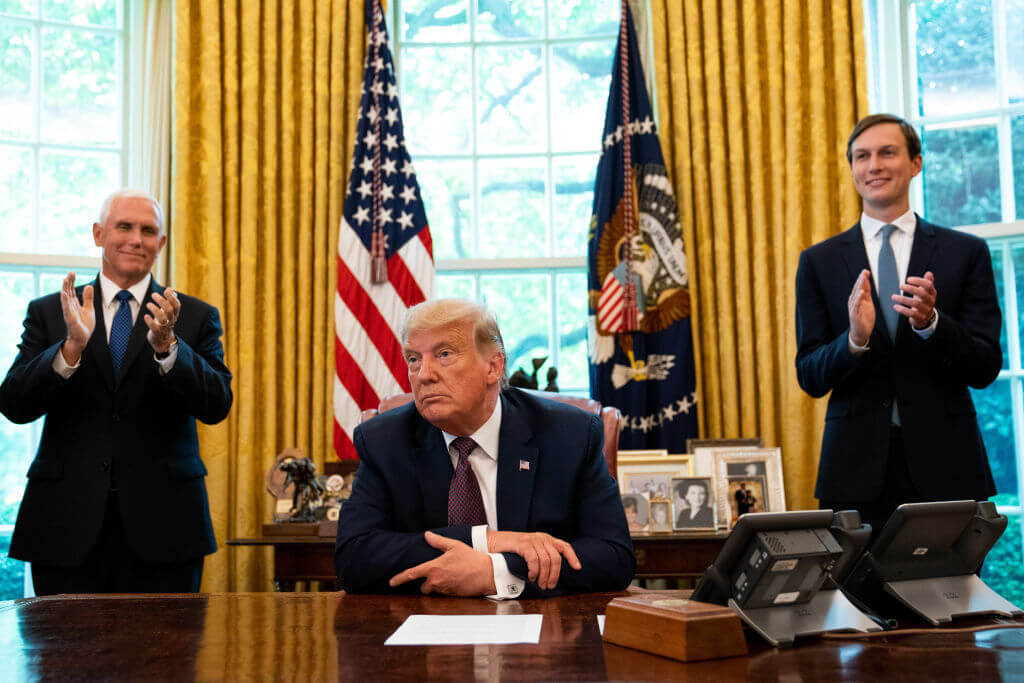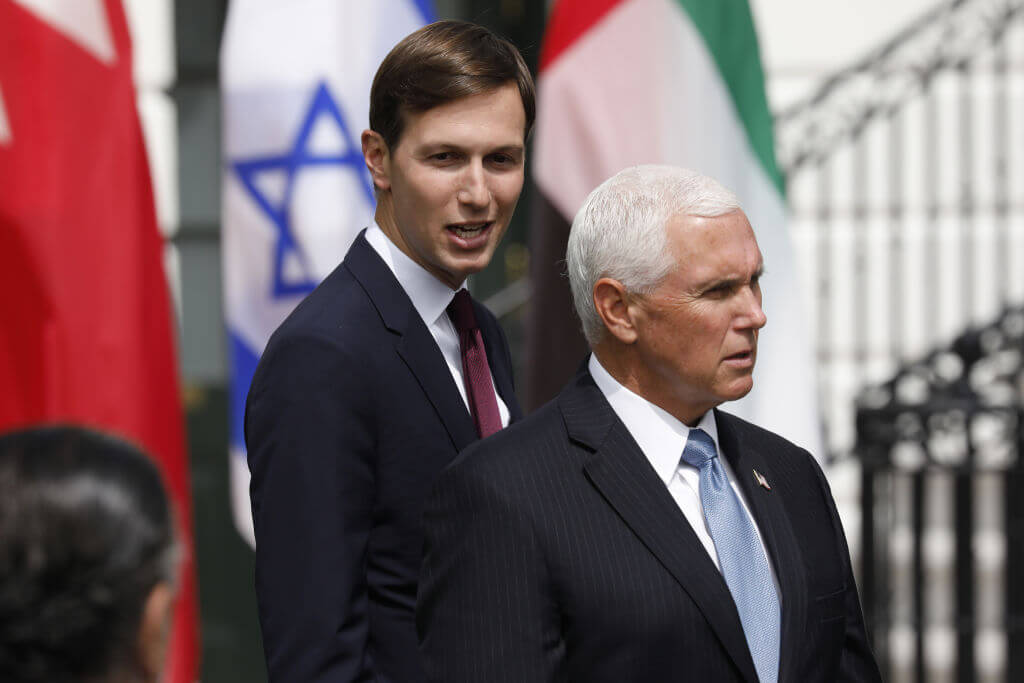Pence defends Trump’s ‘both sides’ comments and record on antisemitism
In a new book, Mike Pence hails the Trump administration’s Israel policy and shares details of a Friday night pizza meal with Jared Kushner

President Donald Trump, flanked by U.S. Vice President Mike Pence, left, and advisor Jared Kushner, right, speaks in the Oval Office on Sept. 11, 2020. Photo by Anna Moneymaker-Pool/Getty Images
Much of Mike Pence’s forthcoming memoir focuses on the Jan. 6 riot at the U.S. Capitol and former President Donald Trump’s rift with him over certifying the results of the 2020 presidential election. In “So Help Me God,” set for release on Tuesday, Pence calls Trump’s actions on that day “reckless” and writes that he endangered him and everyone else at the Capitol. The Forward obtained an advance copy of the book.
But Pence also defends Trump in least in one instance, the controversy that ensued after the former president said that there were fine people on “both sides” of the deadly 2017 “Unite the Right” rally in Charlottesville — remarks that were widely condemned as a dog whistle to white nationalists and neo-Nazis. “I will always believe that what Trump meant was that it was possible that the debate at the center of the march on Charlottesville over the fate of a statue of a historical figure is one that could indeed have well-meaning Americans on both sides,” Pence writes.
Pence writes that it was his job “to stick by the president” and “be of help in times of trouble” when he was first asked to react to criticism of Trump’s first public comments about the Charlottesville violence, which failed to condemn the neo-Nazi groups that descended on the city and chanted “Jews will not replace us.”
Pence adds that he disagreed with Trump’s initial refusal to call out white supremacy, and thought he could have avoided the episode had he spoken with Trump before.
“Donald Trump is not antisemitic,” Pence writes. “He’s not a racist or a bigot. I would not have been his vice president if he was.” He questions those who criticize Trump for trafficking in racist and antisemitic tropes for failing to take into account his daughter’s conversion to Judaism and Trump’s love for his Jewish grandchildren. “In all the time we spent together,” Pence writes, “I had never once seen him mistreat anyone on the basis of race, creed, or color.”
In a recent book, veteran reporter Maggie Haberman highlighted Trump’s “uncertainty” about disassociating himself from white supremacists and antisemites and his tendency to denigrate Jewish relatives and staffers’ observances when it wasn’t convenient for him.
Pizza on Shabbat
In the book, Pence recalls other key moments of Trump’s presidency, including playing an advisory role during the longest government shutdown in U.S. history, a crisis over funding for the border wall that lasted for five weeks.

Pence details a Friday night sit-down with Trump at the vice president’s official home on the grounds of the U.S. Naval Observatory. Trump was accompanied by his chief of staff, Mick Mulvaney, and son-in-law Jared Kushner, an observant Jew. Pence and his wife Karen routinely order pizza for their Friday night dinner. “It was just four guys having pizza on a Friday night,” Pence writes about the meeting’s setup.
The story would seem to run counter to the public narrative that Kushner is an observant Jew. Kushner writes in his memoir, published earlier this year, that working as a senior adviser to the president, his Shabbat observance clashed at times with his professional responsibilities and he therefore could not observe as strictly as he preferred. Similar stories were told in other books about the Trump presidency, in which Kushner rode in cars on Shabbat and didn’t keep strictly kosher.
Jerusalem as the chief of my joy
Pence, an evangelical Christian, also hails Trump’s policy on Israel as a major achievement. He writes that the decision to move the U.S. embassy to Jerusalem in 2017 pushed Arab countries to normalize relations with Israel. Pence was a strong advocate for recognizing Jerusalem as Israel’s capital in internal debates. He suggested that much of his life prepared him for the moment, “to sit by Trump’s desk when the decision was made.”
Pence, who met with Egyptian President Abdel Fattah el-Sisi and Jordan’s King Abdullah II on his 2018 trip to the region, said he understood they were displeased with the move “but not outraged.” He also sensed there was “an opportunity” for peace in the region among Israel’s neighbors.
Pence formally announced the embassy move in a speech at the Knesset. “I was humbled by the ovation that followed my address and left Israel with a sense of optimism about the prospects for a new beginning for peace,” he writes.
Pence, who was governor of Indiana and a member of Congress before Trump made him his running mate, was vocally supportive of the Israeli government.
“In Congress I gave pro-Israel addresses so often I was asked if there was a big Jewish community out in rural Indiana,” Pence writes. In 2016, he was one of the first governors to sign a bill that prohibits his state from dealing with companies that support the Boycott, Divestment and Sanctions movement against Israel. He writes that Ron Dermer, then-Israeli ambassador to the U.S., called it “the strongest anti-BDS bill in the nation.”
















